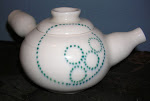My grandfather died almost a year ago. It’s been a hard one, good and bad, but I’ve been busy and it’s gone by quickly. It’s been a year since I started this post -- I promised to post some thoughts regarding my grandfather and other connected things, pottery-related and not, that I’ve been thinking about for a really long time.
My Grandpa Fred worked for an aerospace company. He could build anything in his garage (and he did). He taught me how to weld and how to use a metal-lathe. He built a stern-wheeler out of blocks of balsa wood and metal. If he needed a certain tool to do a job, but didn't have quite the right thing, he would build it himself.
I wish I had been older when he was younger, or that I had been more interested in hanging out with him in the garage. But I'm grateful for the things my grandfather gave me -- good spacial-visualization, confidence in my ability to make things with my hands, the ability to figure out how to do things without being shown. Of course with those things came stubbornness and the belief that I'm probably right even if I have no idea what I'm talking about.
My grandfather made and fixed things, constantly. He got satisfaction from solving problems and working with his hands. I get that same satisfaction, but my life is dramatically different from his -- I have fewer opportunities to make and fix. Pottery fills some of that need, but not all. For the past year or so I’ve been aching to spend more time building, cooking, sewing and growing and less time typing and clicking. Problem is, between the day job and the studio, there just isn't enough time in the day.
Brandon Phillips quoted Matthew Crawford about this time last year, and I’m glad he did because Crawford’s book, Shopclass as Soulcraft, played right into some ideas I’d been turning over in my head for years. Crawford quit a cubical job to be a motorcycle mechanic because he decided he'd rather spend his days actually doing something, rather than typing and clicking.
"The satisfactions of manifesting oneself concretely in the world through manual competence have been known to make a man quiet and easy. They seem to relieve him of the felt need to offer chattering interpretations of himself to vindicate his worth. He can simply point: the building stands, the car now runs, the lights are on."
Industrialization has changed our relationship with the daily grind. Back in the day, people spent their days working to directly produce the things that we now buy at the store. So for most of us, our work days consist of re-arranging bytes with the end goal of making money for a big company, or moving along the bureaucratic process of the government, or something otherwise unrelated to our actual lives. We spend all day in front of a computer, collect our paychecks, go to the gym, buy stuff from the store, live in condos, eat at restaurants. I'm not judging--I do these things myself. I’m not a full-time potter growing my own food. While that sounds lovely, I have no other means of financial support, and I choose the stability of a day-job over an idyllic pastoral existence. We do all these things because that's how we achieve some sort of middle-class American life, and for the most part it's fine.
But we’re not happy! I suppose some people are, but I'm not, and I'm not alone. I think there's something in our biology or psychology that needs to be more directly involved in the creation of the actual physical things in our lives. Building furniture, growing food, baking bread, making pottery. Baking bread in pottery we’ve made! Which brings me around to the question of process vs. product, which is another topic I've given a lot of thought. But this entry is getting really long already, so I’m going to stop here. Just this post -- I’ll keep writing right now so you’ll have the next one very soon. (You probably know better than to believe that, but I’ll try! Like I said, less time typing and clicking!)
Saturday, October 1, 2011
Subscribe to:
Comments (Atom)

